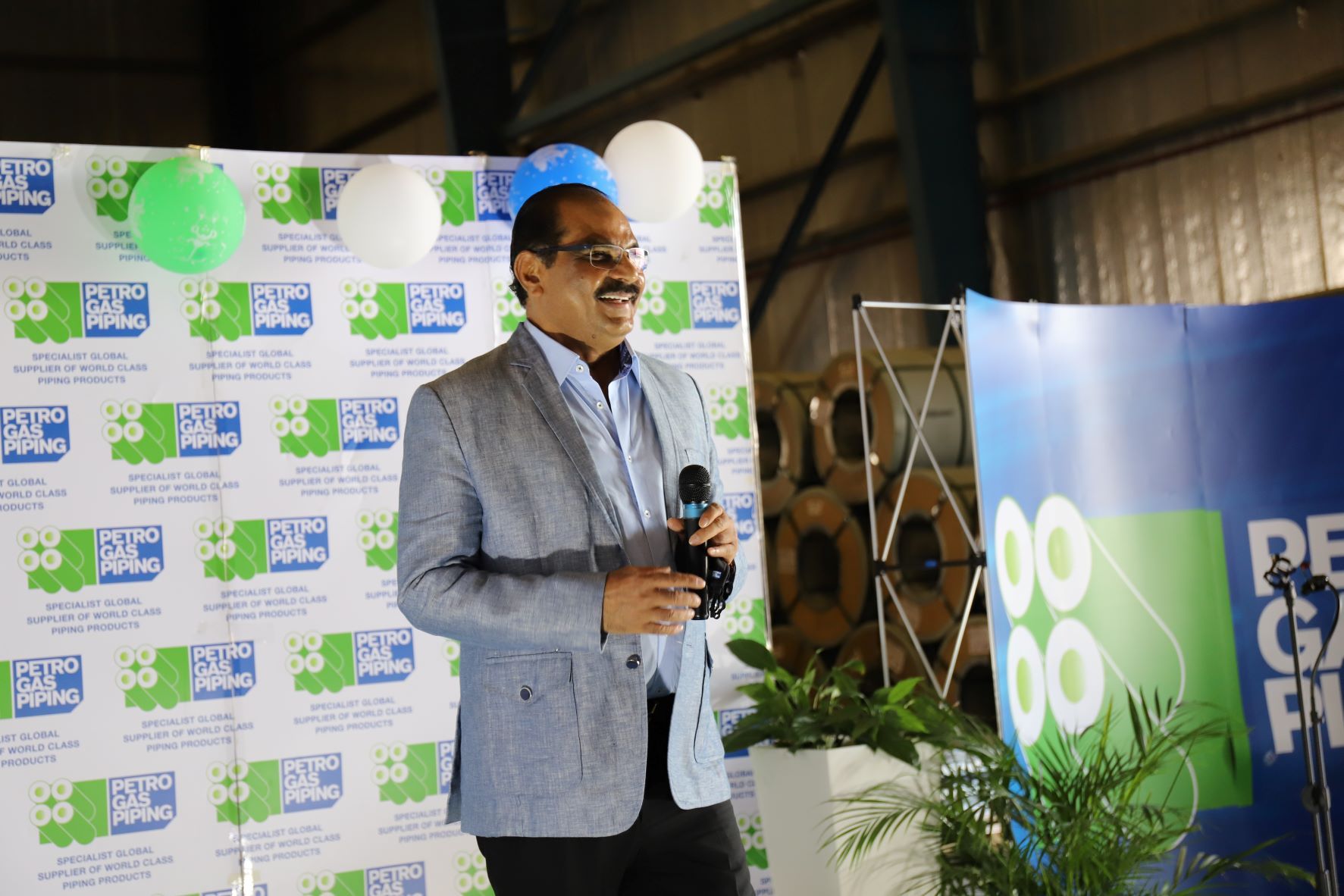1 August 2021
FROM THE CHAIRMAN’S DESK
REDEFINING BUSINESS THROUGH INNOVATION
“COVID-19’s speed and scale has bred uncertainty and emotional disruption with organizations now creating innovative models to build system resilience, bring clarity, and catalyze positive change,” – Nazimuddin Mohammed (Nazim)
Nazimuddin Mohammed (or simply Nazim as he is fondly called), Founder & Chairman of PetroGas Piping is a visionary leader who has pioneered the bulk piping industry in the Middle-East region. With more than four decades of experience, he has shaped the project business in the region for the Oil and Gas Industry. He has consciously worked towards building capabilities to create foundations and accelerate growth for the piping manufacturers and distributors. He has helped establish a vast network of ‘piping industry end-customers’ operational in Oil & Gas, hydrocarbons, infrastructure and industrial segments- supporting their growth and development by being an active Project Management Supply company. His deep insights about the technological and technical nuances of the piping elements and how it is the turn-key for every other end-industry is well recognized. His experience and expertise are complimented by his commitment to foster human capital and nurture the talent.
COVID-19, and its parallel unfolding predicaments have presented leaders with infinitely complicated challenges and no easy answers. There have been tough trade-offs coupled with tough decisions. In such a scenario, a leader like Nazim not only reassured the rattled employees but also thought of introducing innovative yet effective measures to keep the industry registers ringing. He says-
” The world is experiencing an unprecedented Covid-19 scenario in 2021, making several manufacturing industries including Piping materials undergo a complete overhaul, in terms of products and practices. This second wave of coronavirus outbreak carries twin threats to the lives and livelihoods of people, beaconing an industry-wide business-model innovation. It especially concerns businesses who are grappling with a confounding assembly of supply-chain and logistical disruptions.
Ramifications are limited not only to the cost sheet of the organizations but also to the human capital; who face upheavals in their health, education, and workplace systems. Companies are now trying to mitigate this and provide safety and protection to their employees, alongside dealing with a dynamic market environment.
In the last year of the pandemic, PetroGas Piping has rapidly adapted business strategies to address both the challenges and the opportunities. Innovative technology and employee dedication have been instrumental in business-model innovation and workplace evolution, making them the beacons of new-age thought leadership. By focusing on market diversification, workplace mitigation, clear communication and support to employees and stakeholders, scenario planning, and stress tests, we have come out more robust and enthused with vitality to support our industry partners even better.
Across the industry too, business-model innovation has emerged as the key differentiator for those who have gained ground during this crisis. PetroGas Piping, with a footprint across six continents, and as one of the largest distributors of piping products, solutions, and services, undertook the arduous task of this crisis response. During the process, key areas of focus were:
- Nurturing partnerships, both within and outside the organization- Prioritizing the health and safety of our internal stakeholders, our employees through vaccination support, safe workplace practices, partnering with connectivity providers to set up virtual clinics, and teaming up with healthcare centers
- Optimizing IT solutions – Providing customized solutions to meet customer needs through innovative technology world over in all the six continents for end-use industries; such as oil and gas industry, construction industry, infrastructure industry and wastewater treatment industry
- Operational model adjustments- Supply-chain and operating-model to mitigate risks posed by the coronavirus. From striking a balance between the need for on-time delivery to shield against delays or shutdowns by procuring alternative sources of supply; and all the while ensuring a safe work environment for the employees.
It should be noted however, that any business model is contingent to the market environment and the team spirit of the industry players. Amid the Covid-19 crisis, the global market for piping products has exhibited dynamism. In fact, as per Pipes and Fittings Market – Forecast (2020-2025) report, the pipes and fittings market is expected to reach $8 billion by 2025. This is primarily due to factors such as increased urbanization, infrastructure developments, increased pipeline projects, and rising use of pipes in oil, gas, mining and chemical industries. This dynamism and the expanding volume of demand requires a concerted response from all the industry players, versus a competitive response.
In order to meet the new-age Covid-19 era customer needs, industry players need to come together as one tribe and find best solutions and adopt innovative approach to cater to clients and end users. The market has changed in ways unimaginable, and unless we adapt and work together, we will be left behind. While the urgency of crisis response may have spurred many of these innovations, in most cases such business innovation is here to stay. It is time organizations reconsider their supply chain footprint, operational practices and get ready for disruption.
In many ways, Covid-19 has given a fresh start to the piping industry, which then is an opportunity ready to be encashed. If we as an industry align to the new rules of the game- support our partners, and tweak our supply chain & logistics model, there is scope for growth and as an enterprise ability to showcase strategic resilience and organizational agility. Ultimately, these qualities will enable all of us to adapt and thrive through different economic cycles, including the challenging times brought on by the COVID-19 pandemic.”

